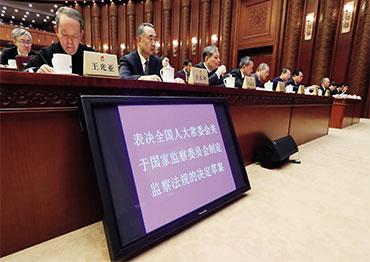In March 2018, the National People’s Congress (NPC), China’s top legislature, announced the establishment of the National Supervisory Commission (NSC), a new anti-corruption body to consolidate the anti-corruption functions of multiple state and Party agencies.
As the NSC reports directly to the NPC, the agency becomes a coequal branch of government running parallel with the judiciary, the Supreme People’s Procuratorate, and the State Council.
The new arrangement grants the NSC considerable power to operate independently of other law enforcement agencies. But at the same time, some of its powers and measures are seen to contradict some existing laws, such as China’s criminal procedure code.
Although the NPC passed the Supervision Law of the People’s Republic of China in 2018 to regulate the NSC’s operation, many legal issues remained unclear. The new regulation appears an attempt to address some of the controversies.
With 287 articles making up nine chapters corresponding to the supervision law, the regulation lists 101 offenses that fall under the jurisdiction of the NSC and articulates a seven-stage supervisory procedure the NSC needs to follow.
In an NSC press release on September 20, the agency said the regulation clarifies the agency’s duties, jurisdiction, supervisory power and working procedures. The NSC said that through the implementation of the regulation, the agency aims to introduce strict regulation on supervisors and promote the law-based exercise of supervisory duties.
The regulation does clarify several issues. One of these is who is subject to the supervisory law and jurisdiction of the NSC.
Prior to the NSC’s establishment, China’s anti-corruption drive was led by the CPC’s Central Commission for Discipline and Inspection (CCDI), which has the power to investigate Party members, who account for about 80 percent of civil servants. After the NSC was established, the supervisory law stipulated that the agency has jurisdiction over “State actors,” including not only public employees, but also other personnel such as managers at State-owned enterprises (SOEs).
“As the law lacks detailed definition, it leads to an important question over whether foreign managers at joint ventures partially owned by SOEs are subject to the law,” Liu Fei, an anti-corruption official from Zhumadian, Henan Province, told NewsChina.
Outlining six types of state functionaries subject to the supervision law, the new regulation stipulates that only managers who are appointed or represent the interests of the State are subject to the law, which effectively excludes both foreign managers of joint ventures and Chinese managers representing private firms.
The regulation specifies that infractions committed by public servants who have left their posts, retired or passed away are still subject to NSC investigation, which was not specified in the supervisory law.
“The move is in line with the overall anti-corruption approach adopted by the top leadership to hold officials accountable for life,” Mao Zhaohui, director of the Center for Anti-corruption and Clean Government at the Renmin University of China in Beijing, told NewsChina.

 Old Version
Old Version
